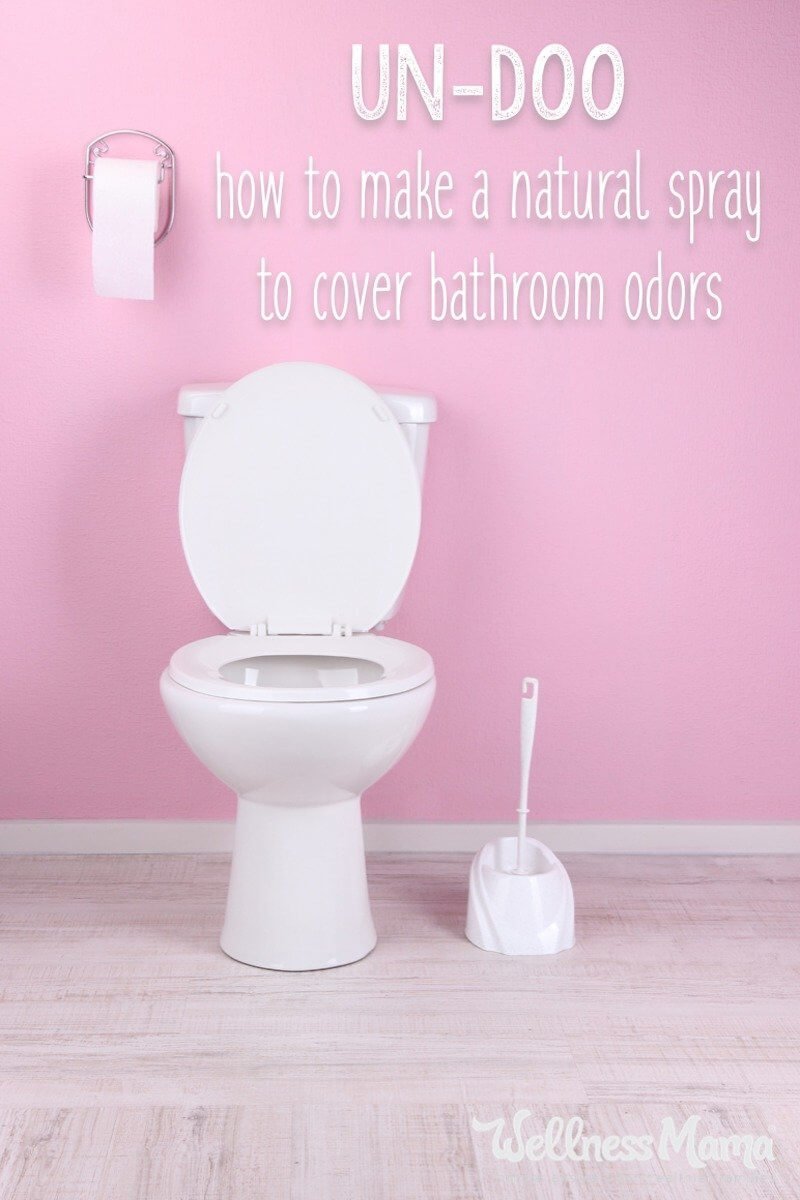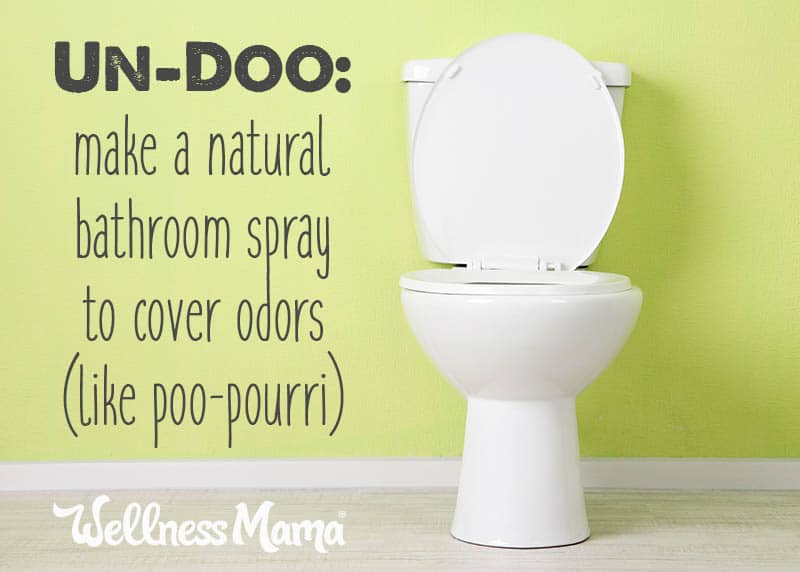Bathroom odors just might be the bane of any moms existence, especially to those of us with lots of littles and a bathroom that gets lots of action. It’s enough of an accomplishment to keep the bathroom clean, but in our home I find a natural bathroom spray is a must for my sanity!
Do You Have a Stinky Bathroom?
I’m not talking about general boy pee smell (that’s a whole other discussion). I’m talking about when you’re done doing your thing … uh … you know!
Just the other day, one of my kids was gasping for air and being overly dramatic upon entering the bathroom after a sibling had exited. We cracked a window and moved on … but it made me think about the popular poo-pourri spray and if there was a way to make a homemade version. The basic idea is that you can spray toilet water with this natural spray before using the restroom to cover up any odor. The Poo Pourri commercial that explains how it works is hilarious!
This is an innovative alternative to conventional bathroom sprays that just target the air itself. These bathroom sprays are commonly used to cover up odors, but are they safe? Recent research says they aren’t.
Harmful Ingredients in Conventional Bathroom Spray
Air fresheners are everywhere. You know them by their strong, synthetic floral or fruity scents, and you can’t miss them anytime you walk into a public bathroom.
But should we keep them around our homes? In a word, no. They’re harmful to our health and a major source of indoor air pollution. In fact, studies have shown that indoor air is often more polluted than outdoor air! Common ingredients you’ll find in air fresheners include at the very least two dangerous toxins.
Phthalates
Often found in synthetic fragrances, phthalates may be responsible for a number of health problems, including infertility. While many companies these days are formulating their products without phthalates due to education about the health problems they cause, it’s hard to know if a product actually contains them without laboratory testing.
If there is “fragrance” on an ingredient label, the product may contain phthalates.
According to the Natural Resources Defense Council:
Phthalates are used in many common consumer products—to soften plastics in children’s toys, as sealants and adhesives in nail polish, and in perfumes and air fresheners. When people use air fresheners, the phthalates are released into the air where they may be inhaled or may land on the skin and be absorbed. Once these chemicals enter the bloodstream, they can alter hormone levels and cause other health problems.
Phthalates are known to interfere with production of the male hormone, testosterone, and have been associated with reproductive abnormalities. Numerous animal studies have linked prenatal exposure to certain phthalates with decreases in testosterone, malformations of the genitalia, and reduced sperm production. The State of California notes that five types of phthalates—including one that we found in air freshener products—are “known to cause birth defects or reproductive harm.” Phthalate exposure in indoor environments has also been associated with allergic symptoms and asthma.
Formaldehyde
A known human carcinogen, formaldehyde is often found in plug-in fragrance warmers and air fresheners, as well as cleaning supplies and other household items. (Although you can help cleanse the air of formaldehyde with common household plants!)
According to this fact sheet from the CDC:
Formaldehyde is known to cause cancer. The cancer of greatest concern is cancer of the nose and throat. Scientific research has not yet shown that a certain level of formaldehyde exposure causes cancer. However, the higher the level and the longer the exposure, the greater the chance of getting cancer. Exposure to formaldehyde might increase the chance of getting cancer even at levels too low to cause symptoms.
With the above in mind, let’s look at some of the health conditions air fresheners may contribute to.
Effects of Artificial “Fresh Air”
Real fresh air found in nature is essential to health and the benefits of nature are well documented. Artificial chemically scented “fresh” air is an entirely different animal and may be linked to some big problems:
Asthma
One of the most common health conditions associated with artificial fragrance use is asthma, allergies, and other respiratory problems.
The problem is when we spray these toxic fragrances into the air, they release tiny chemical particles, which we breathe in. These particles can lead to inflammatory reactions in the lungs and other parts of the body.
Over time a build-up of inhaled toxins weakens and compromises the lungs. Not only does this increase susceptibility to asthma, but it opens the door to frequent respiratory infections and allergies.
Skin Conditions
Whenever toxic chemicals are sprayed into the air to cover up bathroom odors and other stinky stuff, those particles eventually land on our skin, on the floor, on the surfaces we touch.
Repeated contact with harmful chemicals can cause eczema or other skin irritations. In addition, when our body is exposed to harmful chemicals, our immune systems become overactive, creating perfect conditions for more skin irritations. It’s a vicious cycle.
Cancer
As I mentioned, many synthetic fragrances contain formaldehyde, a known human carcinogen.
Routine exposure to sprays used to cover up bathroom odors (think several times a day, every day, for the average family), may cause cell death and toxicity. This can eventually result in the formation of cancer cells. Will being around air-freshener one time cause cancer? No. But repeated exposure may be harmful over time.
Birth Defects & Infertility
The chemicals in conventional air fresheners can disrupt hormones, particularly testosterone. This can lead to infertility in both men and women.
In addition to infertility, toxins like phthalates can cause birth defects such as malformed genitalia and undescended testicles.
Headaches
Many of us are more sensitive to toxic fragrances than we realize.
It’s interesting that when people switch to using only natural fragrances like essential oils for a while, they frequently seem to become even more sensitive to strong artificial smells. I know for me just walking down the cleaning aisle or perfume counter in a store can make me feel queasy or even result in a headache.
In fact, it’s now being said that “fragrances are the new secondhand smoke” because it’s clear that so many of us are sensitive to them. If you get frequent headaches, you might want to examine how many sources of artificial fragrances you’re using in your home or otherwise exposed to on a daily basis.
DIY All-Natural Odor Spray Alternative
We can’t avoid bathroom odors (that wouldn’t be healthy!), but we can find better ways to resolve them. While synthetic fragrances just cover stinky stenches with overpowering chemical smells, we can use natural scents to gently remove smells.
Enter natural bathroom spray!
This spray works just like poo-pourri to seal the water in the toilet and keep out of the air. Poo pourri is actually natural as well and free of harmful chemicals, so it is a great option if you don’t want to make it. It doesn’t just target the air like many sprays, but makes a physical barrier to seal odor in the toilet where it belongs.
How to Make a Natural Bathroom Spray
If you prefer the DIY (like I do), here’s the recipe I use:
Bathroom Spray Ingredients
- 1/2 cup distilled water
- 1 tablespoon vodka, rubbing alcohol, or real vanilla extract (my fave)
- 1 teaspoon vegetable glycerine (not absolutely necessary but helps create the physical barrier)
- 20 drops lavender essential oil
- 15 drops orange essential oil
Note: You can use any essential oils of your choice (aim for around 24-36 drops). Citrus and pine are another nice combination for a fresh, clean scent.
Bathroom Spray Instructions
Combine the ingredients in a glass spray bottle like this one (essential oils don’t do well in plastic bottles) and spritz on the toilet water before you go. To stop bathroom odors before they start, shake spray before each use. Spritz directly into the toilet bowl to create a film over the water. This will help trap stinky smells below the water after you (I mean … your kids, of course!) do your their business.
One Small Change!
When you’re working to raise a healthy family, making one small change at a time makes all the difference.
Swap out harmful artificial fragrance sprays for a healthier, cheaper DIY solution like this Un-D00 bathroom spray and it’s one more step toward a healthier home.
Do you use a bathroom spray to cover up odors? Any favorite tricks or products? Please share in the comments!





Leave a Reply